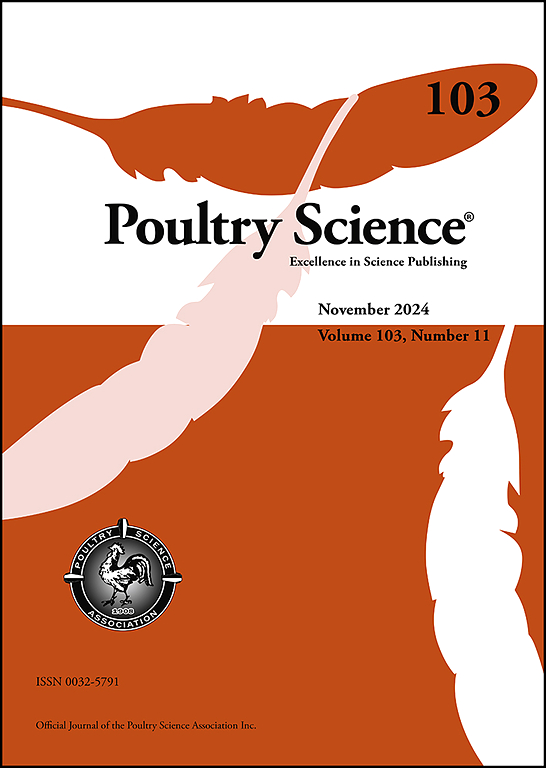Effects of dietary Bacillus subtilis 14823 on growth performance, gut barrier integrity and inflammatory response of broilers raised in a stressful tropical environment
IF 3.8
1区 农林科学
Q1 AGRICULTURE, DAIRY & ANIMAL SCIENCE
引用次数: 0
Abstract
Heat stress (HS) has become a major concern for the poultry industry in many countries. HS impacts gut health by causing damaged mucosal microstructures, increased oxidative stress, weakened immunity, and heightened permeability to toxins and poultry pathogens. We investigated the potential benefits to broiler chickens subjected to HS of dietary supplementation with Bacillus subtilis 14823. Growth performance, gut barrier integrity, and expressions of inflammatory cytokines were analyzed. The results indicated that dietary supplementation with B. subtilis spores at concentrations of 1 × 106 CFU/g of feed (BS6 group) and 1 × 107 CFU/g of feed (BS7 group) improved body weight and body weight gain during d 0–42 (P < 0.05), while the feed intake of the BS7 group was highest (P < 0.05). Additionally, the BS6 group showed a better feed conversion ratio than the control (CON) group (P < 0.05). The BS7 group showed the lowest serum fluorescein isothiocyanate-dextran levels (P < 0.05), and both the BS6 and BS7 groups showed lower corticosterone levels than the CON group (P < 0.05). Additionally, both the BS6 and BS7 groups demonstrated increased villi height and villus height/crypt depth ratio, along with decreased crypt depth in the duodenum and ileum (P < 0.05). However, only the BS7 group exhibited greater improvements than the CON group in the jejunum at d 35. Furthermore, at d 14 and 35, mRNA expressions of occludin, claudin-1, and tight junction protein-1 in the jejunum were upregulated (P < 0.05), and expression levels of five inflammatory cytokine genes were downregulated in the ileum (P < 0.05). Our findings provide new insights and evidence supporting the application of B. subtilis 14823 for enhancing growth performance, gut barrier integrity, and modulating inflammatory cytokines in broilers.
日粮枯草芽孢杆菌 14823 对热带应激环境下饲养的肉鸡生长性能、肠道屏障完整性和炎症反应的影响
热应激(HS)已成为许多国家家禽业关注的一个主要问题。热应激会导致粘膜微结构受损、氧化应激增加、免疫力下降以及对毒素和家禽病原体的渗透性增强,从而影响肠道健康。我们研究了日粮中添加枯草芽孢杆菌 14823 对遭受 HS 影响的肉鸡的潜在益处。我们对生长性能、肠道屏障完整性和炎症细胞因子的表达进行了分析。结果表明,日粮中添加浓度为 1 × 106 CFU/g 饲料(BS6 组)和 1 × 107 CFU/g 饲料(BS7 组)的枯草芽孢杆菌孢子可提高 0-42 d 的体重和增重(P < 0.05),而 BS7 组的采食量最高(P < 0.05)。此外,BS6 组的饲料转化率优于对照组(CON)(P < 0.05)。BS7 组的血清异硫氰酸荧光素-葡聚糖水平最低(P < 0.05),BS6 组和 BS7 组的皮质酮水平均低于 CON 组(P < 0.05)。此外,BS6 组和 BS7 组的绒毛高度和绒毛高度/隐窝深度比均有所增加,十二指肠和回肠的隐窝深度有所减少(P < 0.05)。然而,在第 35 天时,只有 BS7 组的空肠比 CON 组有更大的改善。此外,在第 14 天和第 35 天,空肠中闭塞素、Claudin-1 和紧密连接蛋白-1 的 mRNA 表达上调(P < 0.05),回肠中五个炎性细胞因子基因的表达水平下调(P < 0.05)。我们的研究结果为支持应用枯草杆菌 14823 提高肉鸡的生长性能、肠道屏障完整性和调节炎症细胞因子提供了新的见解和证据。
本文章由计算机程序翻译,如有差异,请以英文原文为准。
求助全文
约1分钟内获得全文
求助全文
来源期刊

Poultry Science
农林科学-奶制品与动物科学
CiteScore
7.60
自引率
15.90%
发文量
0
审稿时长
94 days
期刊介绍:
First self-published in 1921, Poultry Science is an internationally renowned monthly journal, known as the authoritative source for a broad range of poultry information and high-caliber research. The journal plays a pivotal role in the dissemination of preeminent poultry-related knowledge across all disciplines. As of January 2020, Poultry Science will become an Open Access journal with no subscription charges, meaning authors who publish here can make their research immediately, permanently, and freely accessible worldwide while retaining copyright to their work. Papers submitted for publication after October 1, 2019 will be published as Open Access papers.
An international journal, Poultry Science publishes original papers, research notes, symposium papers, and reviews of basic science as applied to poultry. This authoritative source of poultry information is consistently ranked by ISI Impact Factor as one of the top 10 agriculture, dairy and animal science journals to deliver high-caliber research. Currently it is the highest-ranked (by Impact Factor and Eigenfactor) journal dedicated to publishing poultry research. Subject areas include breeding, genetics, education, production, management, environment, health, behavior, welfare, immunology, molecular biology, metabolism, nutrition, physiology, reproduction, processing, and products.
 求助内容:
求助内容: 应助结果提醒方式:
应助结果提醒方式:


